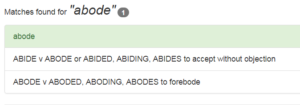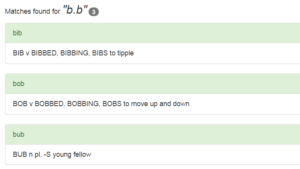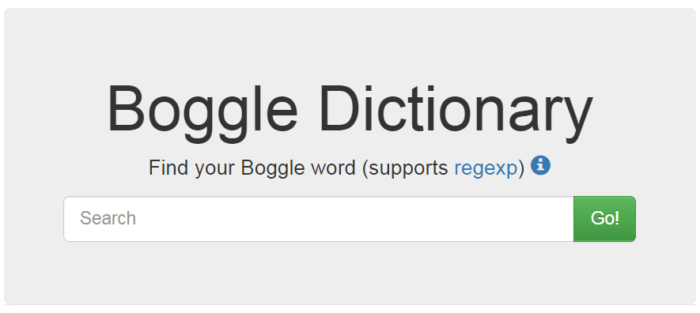This is a simple dictionary that I made and use to play Boggle. To launch the dictionary, click on the button below:
UPDATE May 2022: Several have reached out and asked why the dictionary is missing words. This is because the underlying OWL2 dictionary limited the length of base words. I have updated the dictionary to use the CSW2019 dictionary. There are significantly more words in this dictionary, so beware that you will need to change your game! You can still find the old dictionary here if you are attached to it.
Introduction
My wife and I have played a large amount of Boggle over the years. For some time, when there was a questionable word, we would just google to see if there was a definition for it. We found that this was getting very inconsistent because different dictionaries have different words in them. So I decided to fallback to more standard dictionaries that are used for Scrabble. There are a number of standard ones, very highly controversially pruned and managed, so we just picked one, called the OWL2 dictionary. (Now updated to the CSW).
For our own Boggle pleasure, I created a simple utility to lookup into the dictionary to give us a clear YES or NO for our Boggle words. In reality, it’s just me (not my wife) who usually makes up words, so we typically just use it for my words. I had written it years ago to just run from a laptop, but just now updated it to be mobile-friendly and decided to put it online so others could use it too.
There is nothing in particular that ties it to Boggle, but that is what it was created to do. So it can be used for Scrabble, or any other dictionary need you may have. I decided NOT to filter out two-letter words, although they are invalid in Boggle.
How to Use It
The dictionary should be relatively self-explanatory. You type your word, and then press enter, or click Go!. The words and their definitions are then displayed underneath the search window, as shown below:

In this example, abode has two different definitions and both are displayed.
Matching Patterns
The search term actually supports Regular Expressions, which allow you to look for patterns and ranges of words. Although Regular Expressions are fairly complex, you can get a lot out of them even if you just know some basics. For example, a dot “.” matches any character. So if you search for “b.b“, it will return all words that start and end with a b and have exactly one letter in the middle: bib, bob, and bub. 
Or if you want to know all the ten-letter words that start with the letter z, you just type in z followed by nine dots: “z………“. (Turns out there are 11 of those!).
Another useful Regular Expression trick is if you want to look for letter “a” OR letter “b” in a certain position. To do this, you just put the letters in square brackets. For example, “[bch]at” would match bat, cat and hat.
If you really want to get into the world of Regular Expressions there is plenty of documentation online. One good cheatsheet can be found here, which is also linked to from within the tool.
House Rules
We have a few house rules when playing Boggle under our roof. We like them, as they keep us in line. Here they are:
- Offensive words don’t count – The dictionary includes words that are deemed offensive or vulgar. These are not currently filtered out, although some competitions, as I understand, use dictionaries that do not include foul language. The dictionary tags these words with *offensive*, so they are easy to pick out. Our own house rules are that if the word is deemed offensive, then it doesn’t count and should be scratched off the list.
- Penalty for made up words – If a word is looked up and is found to not exist, then we subtract one point. This keeps us in check, and really makes you think twice before just jotting down any old word. It also helps us improve our vocabulary by actually paying attention to what is fact, and what is contrived.
- Plurals must be spelled out – Some people just put an “(s)” at the end of the singular form of a word to count for both, but we enforce the full spelling of the plural.
How It Works
If you are interested in learning more about how the dictionary was created, you can find that here. I go into a bit of detail on how it works and how I pieced it together.

